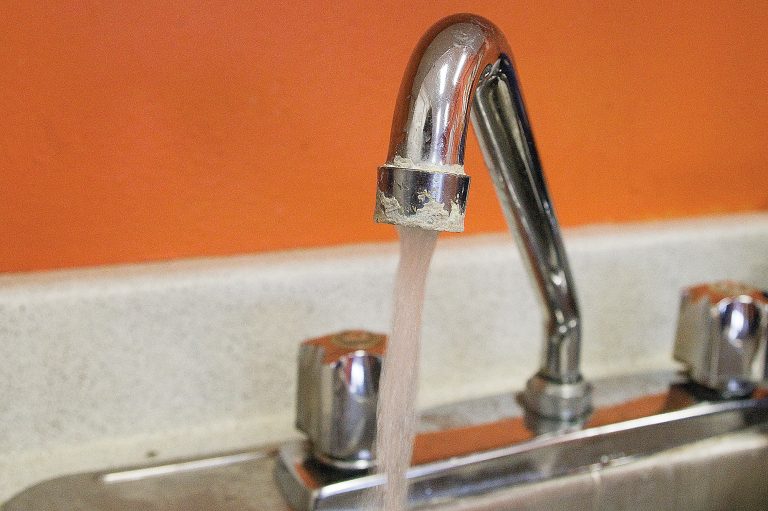
Prince Albert city council has voted against an amendment to delay increasing the deposit on new water utility accounts until after the provincial state of emergency ends.
Council voted 7-2 against the proposal, which would have temporarily stalled the City’s plan to increase deposits from $150 to $250. Couns. Charlene Miller and Terra Lennox-Zepp were the only ones to vote in favour of the delay.
Lennox-Zepp said the decision will negatively affect Prince Albert residents who are struggling to pay their bills during the COVID-19 pandemic.
“Having access to water is a pivotal part of containing this pandemic in our city and that there are people in our community who cannot afford an extra $100,” Lennox-Zepp said during the June 29 city council meeting. “It makes sense during a pandemic to wait on this, and not make it even more inaccessible for people to be able to have water.”
Mayor Greg Dionne isn’t worried that low-income Prince Albert residents will be able to pay their bills. He said residents he’s talked to are making more now than they did before COVID thanks to generous federal aid programs like the Canada Emergency Response Benefit (CERB).
“It’s hard for me to agree on a program to stop it during this (pandemic) when I know that millions of them are getting cheques from the federal government and actually doing better than they were before COVID,” Dionne told council. “Lots of people have been using COVID as an excuse, but life has to go on. COVID is going to be around for a while, so we might as well get used to it and change our lives.”
CERB provides $500 a week to residents who were forced to stop working because of the pandemic, as long as they made at least $5,000 within the previous 12 months. However, Lennox-Zepp said not all vulnerable residents can benefit from those programs. Saskatchewan is one of several provinces that does not allow residents to keep their CERB cheques while using social assistance.
Even without the pandemic, Lennox-Zepp said the City of Prince Albert doesn’t have enough data to support the $100 increase. She’s worried tenants and renters may be unfairly targeted while property owners are let off the hook.
“I’ve opposed this issue as it’s gone through the process,” she said. “We don’t even have the data to tell us what percentage of these arrears are the responsibility of tenants, and what percentage are property owners. We don’t have the data to make this decision.”
Water utility bills are the City’s highest outstanding balance. It’s also the City’s second largest fund.
According to a 2018 report, there is more than $1.4 million in unpaid utility bills from 4,657 accounts. The oldest unpaid account dates back to 2007. At the time, city administrators said 4,080 of those accounts were renters, while the remaining 557 were property owners. With property owners, those bills are simply added on to their property taxes.
During the meeting, Cheryl Tkachuk, the City’s financial director, said they have no up-to-date information on how many of those unpaid bills are from tenants or property owners, since their system doesn’t differentiate between the two. She also said that in her tenure as financial director, the city has never had to add an unpaid water bill on to someone’s property taxes.
“Usually that person is in property tax arrears as well,” she told council. “Usually it’s a whole financial (problem).”
Councillors who rejected the amendment and voted in favour of the $100 increase say it’s designed to protect taxpayers, who are on the hook for too many unpaid utility accounts.
Coun. Evert Botha was the proposal’s most vocal supporter. He and others say they don’t know when the provincial state of emergency will end, but taxpayers need protection right now.
“This is just us as council and administration drawing a line in the sand and saying, ‘you know what? If you want to be a client of the water utility within the City of Prince Albert, instead of paying $150 deposit, it’s $250 deposit,’” Botha said during the meeting. “I do believe that is a fair increase.”
“We have a responsibility to protect the taxpayers, and we have millions of dollars that have just gone down the water pipes and down the sewer pipes over the years from unpaid utility bills,” Coun. Ted Zurakowski added. “We need to stop that flow. We cannot afford to provide everything to everyone. People need to be responsible for their utility bills.
“We heard from the director tonight that she has never heard of having to place outstanding utility bills on the property taxes of the homeowner, so then by process of elimination, where do you think the bulk of those outstanding bills come from? From the renters, so let’s be honest about that”
The proposal to raise the utility deposit passed first and second reading, but did not receive unanimous consent for the third reading. It will be back on the agenda for one final reading before it becomes law.
Through March, April and May, 262 new water utility accounts were created in Prince Albert. That amounts to around three or four per day.
The $100 deposit increase will not be applied to existing utility accounts.
